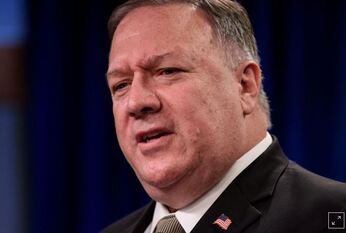Trump plans Nevada rally despite coronavirus restrictions on large gatherings
President Trump is moving ahead with plans to hold a rally in Nevada despite coronavirus concerns raised by Governor Sisolak and local authorities about large gatherings. Nikole Killion reports.
President Trump is moving ahead with plans to hold a rally in Nevada despite coronavirus concerns raised by Governor Sisolak and local authorities about large gatherings. Nikole Killion reports.
Why the US is risking a Pearl Harbor in space
Sep. 13 - For the last decade, Beijing and Moscow have both reorganized their militaries — and developed weapons — to wage a space war against the United States. The situation is now so precarious that America could face a Pearl Harbor in space.
As far back as 2007, China shocked the world when it launched an antisatellite (ASAT) weapon into low-Earth orbit and decimated a derelict weather satellite. ASAT technology is not new but the way China deployed it was both irresponsible and aggressive. Traditionally, countries have publicly announced when they planned to conduct ASAT tests, because they could damage satellites passing by the test site. China told no one. Then, China’s ASAT test created the largest debris field in human history. It also signaled to the West that China was ready for a new form of combat.
China has invested heavily in lasers powerful enough to blind American satellites. Beijing has also developed the ability to “spoof” American GPS satellites, which could confuse American military units and weapons in times of war. On Sept. 3, China surprised the world when it launched a reusable spacecraft that, before returning to Earth three days later, released a smaller object that still remains in orbit today. There is concern that this device is an offensive “space stalker” designed to covertly tailgate American satellites and push them from their orbits.
Russia has nearly identical counterspace capabilities. As recently as July, the US and UK governments accused Russia of illegally testing a space stalker in orbit.
This is all deeply worrying. Either Beijing or Moscow could use their technological might to rewrite the geopolitical order in their favor. US forces patrolling the South China Sea, for example, could find themselves under attack from China but unable to call for reinforcements or coordinate a viable defense — simply because their critical satellites have been destroyed before the siege began... more
Related Article: Opinion/Will: The eroding U.S. military dominance
Sep. 13 - For the last decade, Beijing and Moscow have both reorganized their militaries — and developed weapons — to wage a space war against the United States. The situation is now so precarious that America could face a Pearl Harbor in space.
As far back as 2007, China shocked the world when it launched an antisatellite (ASAT) weapon into low-Earth orbit and decimated a derelict weather satellite. ASAT technology is not new but the way China deployed it was both irresponsible and aggressive. Traditionally, countries have publicly announced when they planned to conduct ASAT tests, because they could damage satellites passing by the test site. China told no one. Then, China’s ASAT test created the largest debris field in human history. It also signaled to the West that China was ready for a new form of combat.
China has invested heavily in lasers powerful enough to blind American satellites. Beijing has also developed the ability to “spoof” American GPS satellites, which could confuse American military units and weapons in times of war. On Sept. 3, China surprised the world when it launched a reusable spacecraft that, before returning to Earth three days later, released a smaller object that still remains in orbit today. There is concern that this device is an offensive “space stalker” designed to covertly tailgate American satellites and push them from their orbits.
Russia has nearly identical counterspace capabilities. As recently as July, the US and UK governments accused Russia of illegally testing a space stalker in orbit.
This is all deeply worrying. Either Beijing or Moscow could use their technological might to rewrite the geopolitical order in their favor. US forces patrolling the South China Sea, for example, could find themselves under attack from China but unable to call for reinforcements or coordinate a viable defense — simply because their critical satellites have been destroyed before the siege began... more
Related Article: Opinion/Will: The eroding U.S. military dominance












